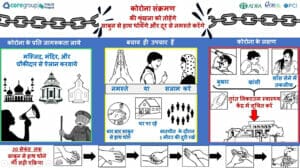News > Blog
Same Heroes, New Culprit: Pivoting from Polio to COVID-19
Published 05/15/2020 by Global Communities
In India, the same unsung heroes who helped stop the spread of polio are working tirelessly to defeat COVID-19.
Drawing on decades of experience in community engagement and communication on polio prevention and routine immunizations, PCI/India’s CORE Group Polio Project (CGPP) recently pivoted to raising awareness about the coronavirus. Staff are proactively reaching communities where access to sanitation and health services is low and quality information can be hard to come by.
“In the case of the coronavirus, there is still no vaccine or drugs. But in both cases, the common thread has been the challenge of supplying correct and consistent messages,” said Dr. Sudipta Mondal, PCI/India’s Director of Monitoring, Learning & Evaluation. “We want to save the community from myths and misconceptions.”
Four District Mobilization Coordinators and 22 Block Mobilization Coordinators are helping disseminate urgent, government-approved health messages and updates on the COVID-19 pandemic across five districts of western Uttar Pradesh. These communications efforts are largely carried out by 333 Community Mobilization Coordinators (CMCs) who are volunteering their time and skills to help keep local families informed, healthy and safe.

To stop the spread of COVID-19 in Uttar Pradesh, India, volunteer Community Mobilization Coordinators are helping disseminate urgent health messages about handwashing and social distancing in remote communities. This e-flyer titled “Break the Chain of Coronavirus Transmission” was developed by Rina Dey, communications specialist for the CORE Secreteriat in India, with support from PCI, the Adventist Development and Relief Agency and Catholic Relief Services.
“For PCI, the main connecting tissue between the community and the program is the bevy of CMCs. They are from the same community and enjoy the absolute trust of the community,” Mondal said. “They know how to pass the message across and convince the community to adapt to the new challenges.”
The virtual training curriculum for field staff is based on findings from a rapid response telephonic survey which PCI/India developed to assess people’s knowledge, attitudes and perceptions concerning the risk of COVID-19 infection. Messages about handwashing, social distancing, coronavirus symptoms and other key topics are being delivered through WhatsApp and tele-meetings.

Ruhi Emami, Volunteer Community Mobilization Coordinator, PCI/India
“We talk about the importance of lockdown, ask them to use a mask while going outside, remind them to wash their hands often and maintain social distance,” said Ruhi Emami, a CMC in Meerut district who has been working with PCI/India since 2014. “Most people ask when the vaccine will come, and they carefully listen to all our messages. They respond positively to us when we share information on COVID-19.”
Heena Khan, 23, is a CMC in Pooth Khas, a village in the Rohta block of Meerut district. She has been working with PCI/India for the past nine years and decided to volunteer her services for the COVID-19 response after learning about a confirmed case in her community.
“In our village, not all people have a phone or television, so they have a lack of awareness. … A large number had no clue about the pandemic,” Khan said. “When we sensitize them about the facts, safety measures and how to maintain the lockdown do’s and don’ts, they listen to us with interest and show their gratitude towards us.”
CGPP field staff are in constant contact with local health and government officials, providing a weekly report on confirmed COVID-19 cases, the number of people in quarantine, and how many individuals and families have been contacted and tele-counseled through the project. PCI/India is also keeping track of prevailing myths and misconceptions about the disease and/or quarantine process to strengthen and inform future messaging.
Between May 3-9, CMCs reached out to 9,414 community members, 4,613 families, 915 community influencers and contacted 14 return migrant families. CGPP staff also received 330 calls from various people asking for information on COVID-19 during that period.
“There is no measure in place to know the effect of the CMC’s work with the community, but the CMCs share that community members and the influencers listen to them carefully,” Mondal said. “Community members often ask our CMCs when they can see the situation improving, or ‘When will the vaccine be available?’ Some are also curious to know, if there is no drug available, then what treatment are doctors providing when someone is admitted into a hospital with the infection.”
And so the fight to inform continues.
“We need color amid the pale circumstances through which we are passing each day,” Mondal said. “Official statistics say the virus has infected 79,000 people in India, but our conjecture is that many more are out there living with the virus.”
Yatender Singh and Dr. Sudipta Mondal contributed to this story.





